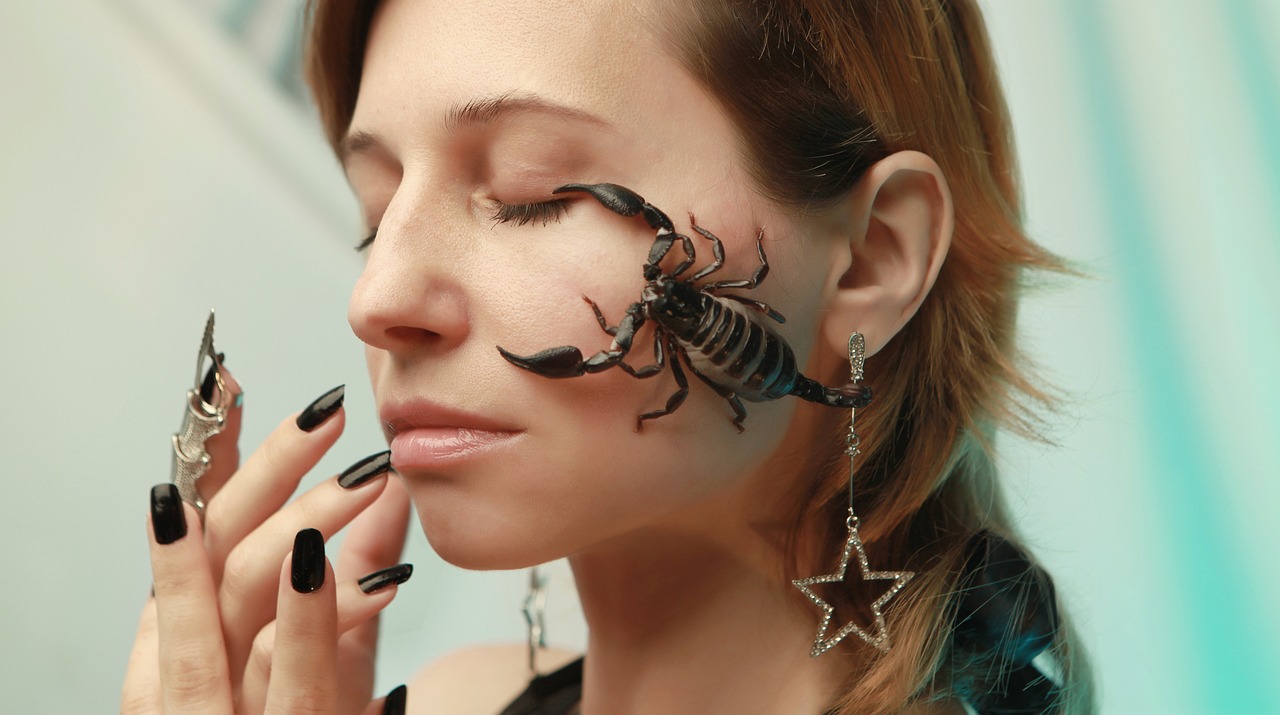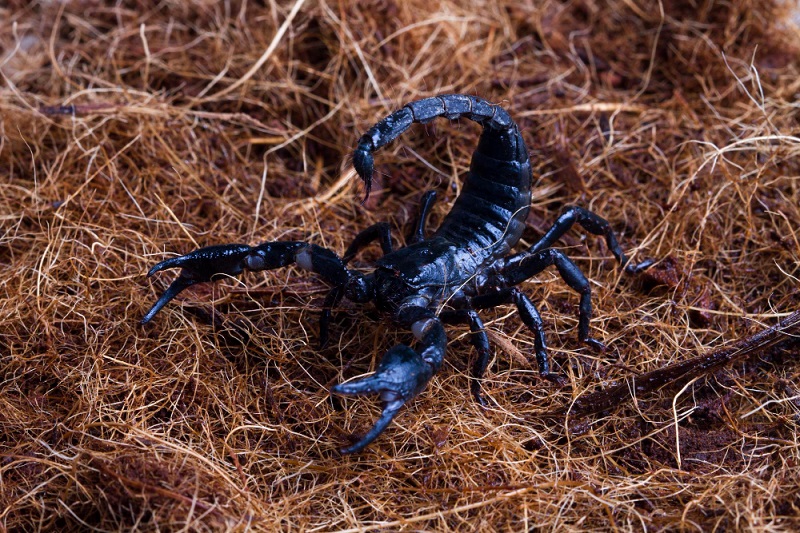The Asian Forest Scorpion is a fascinating and intimidating creature, yet many people find them fascinating enough to keep as pets. Native to the humid forests of Southeast Asia, these scorpions are known for their large size and striking black bodies. Although they may seem scary, they can be an excellent addition to any insect enthusiast’s collection.
This guide will explore everything you need to know about the Asian Forest Scorpion, including their habitat, diet, care, and much more. You’re in the right place if you’re curious about keeping one or simply learning more about these scorpions.
What is an Asian Forest Scorpion?
The Asian Forest Scorpion (Heterometrus spp.) is a species found in tropical regions, particularly in countries like India, Sri Lanka, Malaysia, Thailand, and Vietnam. It is one of the largest scorpions in the world, with adults reaching up to 5-6 inches in length. Despite their fearsome appearance, their venom is not highly dangerous to humans, though it can cause pain like a bee sting. In the wild, they have natural predators such as birds, small mammals, and other larger scorpions.
Wildlife Habits, Habitat, and Diet of the Asian Forest Scorpion
The Asian Forest Scorpion thrives in the humid, tropical rainforests of Southeast Asia, particularly in countries like India, Sri Lanka, Malaysia, Thailand, and Vietnam. These scorpions are nocturnal and prefer dark, damp areas such as under rocks, logs, and dense vegetation. They are highly territorial and often found alone, defending their burrows or hiding spots fiercely. The natural habitat of the Asian Forest Scorpion is characterized by high humidity (75-80%) and warm temperatures ranging between 75-85°F (24-29°C). In the wild, they feed on a variety of insects like crickets, beetles, and sometimes small vertebrates like lizards or frogs. Their large pincers are their primary hunting tool, used to grasp and crush prey. They are well-adapted to surviving in the moist, tropical environments, where their dark, glossy bodies blend into the forest floor, helping them avoid predators and ambush prey.
If you plan to keep one as a pet, you need to mimic their natural environment. A terrarium with damp substrate and a temperature of 75-85°F (24-29°C) would be perfect. Make sure the humidity is around 75-80% by misting the enclosure regularly.
Behavior and Temperament
Despite their intimidating appearance, Asian Forest Scorpions are more defensive than aggressive. They are nocturnal creatures, more active at night, and spend their days hiding in burrows or under debris. Understanding their behavior and temperament is key to responsible ownership.

Interaction with Humans
Although they have venom, the sting of an Asian Forest Scorpion is not deadly to humans unless you are allergic. Their primary defense is their big pincers which they use to grasp and crush prey.
Handling should be minimal as it can stress the scorpion. If you must handle one, use long tongs or forceps to avoid getting stung.
Diet of the Asian Forest Scorpion
In the wild, Asian Forest Scorpions feed on insects like crickets, beetles and sometimes small lizards or frogs. They are opportunistic feeders, meaning they will eat whatever they can catch. When kept in captivity, their diet should mainly consist of crickets, mealworms, and roaches.
Feeding Tips
Feed your scorpion once or twice a week depending on size and age. Make sure the insects you offer are gut-loaded, meaning they’ve been fed nutritious food to pass on to your scorpion.
Remove any uneaten prey after 24 hours to avoid the enclosure becoming dirty or attracting other pests.
How to Care for an Asian Forest Scorpion
Caring for an Asian Forest Scorpion requires attention to detail, from setting up the right habitat to temperature and humidity control and a regular feeding schedule. Here are the basics to keep your scorpion healthy and happy and to remind you of the commitment and responsibility that comes with pet ownership.
Enclosure Setup
- Size: One scorpion per 10 gallon terrarium. Make sure the tank has a secure lid; scorpions are great climbers.
- Substrate: Use coconut fiber, peat moss or both as a substrate. It should be at least 3-4 inches deep for burrowing.
- Hiding Spots: Provide several hiding spots with rocks, bark or hollow logs.
- Humidity: 75-80% humidity. Mist the enclosure regularly with water.
Temperature
75-85°F. Under-tank heater or heat lamp. Not in direct sunlight. Too hot. Too fast.
Lifespan and Molting
The average lifespan of an Asian Forest Scorpion is around 5-8 years. Like all arachnids, they grow by molting and shedding their exoskeleton as they mature. They become more vulnerable during this time, so avoiding handling or disturbing them is important. Molting is a process where the scorpion sheds its old exoskeleton and grows a new one. Signs that your scorpion is about to molt include reduced activity, refusing food, and spending more time in hiding.
Molting Signs
- Reduced activity
- Refusing food
- Spending more time in hiding
After molting, your scorpion’s new exoskeleton will be soft and needs time to harden, so give it space.
Common Health Issues
While Asian Forest Scorpions are relatively hardy creatures, they can still suffer from a few health problems. These issues often arise from poor enclosure conditions or improper diet.
Common Issues
- Dehydration: Keep humidity levels up and provide a shallow water dish.
- Stress: Overhandling or loud noises can stress scorpions. Minimise interaction and keep the enclosure quiet.
- Parasites: Keep the enclosure clean to prevent mites.
Some questions about the Asian Forest Scorpion
- Is it safe to have an Asian Forest Scorpion as a pet?
It is generally safe to have an Asian Forest Scorpion as a pet but precautions are needed. They are not aggressive and only sting if they feel threatened. Their venom is not deadly to humans but can hurt like a bee sting. With the right care and a secure, suitable enclosure, you can ensure the safety of the scorpion and your household.
- How long do they live?
Asian Forest Scorpions can live up to 5 to 8 years in captivity with proper care. Diet, habitat and overall health can affect their lifespan. Keeping the enclosure clean and the temperature and humidity right will help them live longer.
- How big do they get?
Asian Forest Scorpions are one of the bigger species of scorpions. They can grow up to 5 to 6 inches (12 to 15 cm) in length including the tail. Their size and dark colour make them look very impressive.
- Are they dangerous?
Are Asian Forest Scorpions Dangerous? Not at all. While they do have venom, their sting is comparable to that of a bee or wasp and will cause mild to moderate pain. However, individuals with allergies or sensitivities to insect stings should be careful. The scorpion’s primary defense is their large pincers, which can cause discomfort if they grab you.
- Are they venomous?
Yes, Asian Forest Scorpions are venomous, but their venom is mild and not life-threatening to humans. The venom is used to subdue prey (insects) and not for defense. A sting will cause pain, swelling, and discomfort, but medical attention is rarely needed unless an allergic reaction occurs.
- Why do people fear Asian Forest Scorpions?
People fear Asian Forest Scorpions because of their looks, large pincers and association with other scorpions or venomous animals. The fact that they are nocturnal and hide most of the time adds to their mysterious and sometimes feared reputation. Many people are afraid of scorpions in general because of the possibility of being stung even though the Asian Forest Scorpion’s venom is mild.
- Can I keep more than one?
No. Asian Forest Scorpions can be territorial and will fight if kept together.
- How often do I feed?
Once or twice a week. Depends on the size and age of the scorpion.
Conclusion
The Asian Forest Scorpion is a great species to have and can be very rewarding. They can thrive in captivity and live long and healthy lives with the right care. But you have to create the right environment, give them a balanced diet, and handle them carefully so they stay stress-free.
If you want to keep one of these scorpions as a pet, research thoroughly and provide them with the care they need to flourish.




